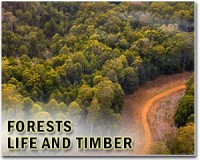| . |  |
. |
United Nations (AFP) Feb 2, 2011 The world's forest area could start expanding again in a few years, a top UN expert said Wednesday as the United Nations launched an international year of forests. But trees are still being cut down at an "alarmingly high" rate, particularly in the Amazon and Africa, according to the latest UN Food and Agriculture Organization (FAO) global study. And many of the new trees will have only "junk" value in disposing of the greenhouse gases that are causing global warming, said the FAO assistant director general Eduardo Rojas-Briales. China has launched a massive reforestation program boosting Asia's total and the forest area has grown in Europe and North America over the past decade, said the FAO's "State of the World's Forests" report. The 4.032 billion hectares (9.9 billion acres) of forests in the world in 2010 is down from an estimated 4.085 billion in 2000, said the FAO. But the speed at which which trees are being cut down is slowing from 8.3 million hectares a year in 1990-2000 to 5.2 million in the past decade. "There are evident signs that we could arrive at a balance in a few years," said Rojas-Briales, adding that the deforestation rate was 50 million hectares a year 30 years ago. "Of course we will still lose very valuable forest and we will gain many junk forests with not so much carbon storage value" and so not able to soak up the same amount of greenhouse gases as the forests lost in recent decades. China is taking its forested area from 120 million hectares to 200 million, said the UN official, who also praised efforts by South Korea and India. Overall, Asia's forest area has increased from 90.5 million hectares in 2000 to 119.8 million in 2010, said the report. South America's forest area has fallen from 904 million hectares to 864 million in the past decade. Rojas-Briales said Latin America remains a problem because it has not used its economic growth of recent years to help forests. "In East Asia they are putting resources and policies into position, in Latin America we don't see this," said the FAO official. He added however that there were preliminary signs of a "significant" reduction in deforestation in the Brazilian Amazon over the past two years. Africa's forest land has fallen from 20 million hectares in 2000 to 19.5 million at the end of the decade, said the FAO report. Europe's total has risen from 998 million hectares to just over one billion over the past decade. The launch of the International Year of Forests was carried out by top UN environment officials and Wangaari Maathai, the Kenyan who was awarded the Nobel Peace Prize in 2004 for her campaigning in defence of trees. The Conservation International group released a special study for the launch saying that six of the world's 10 most threatened forest zones are in Asia. The International Year of Forests "should focus the world's attention on the need to increase the protection of forests and make sure that their high importance for biodiversity conservation, climate stabilization and economic development is not undervalued," said Conservation International. It said the Indo-Burma river and floodplain wetlands, the New Zealand forests, forests in the 17,000 equatorial islands of Borneo and Sumatra in southeast Asia, the Philippines tropical forest and the forest on Brazil's Atlantic coast are the most threatened. "These forests have all lost 90 percent or more of their original habitat and each harbor at least 1,500 endemic plant species," said the report. "If these forests are lost, those endemic species are also lost forever."
Share This Article With Planet Earth
Related Links Forestry News - Global and Local News, Science and Application
 Indonesia makes startling admission on forests
Indonesia makes startling admission on forestsJakarta (AFP) Feb 1, 2011 Indonesia admitted Tuesday that hundreds of mine and plantation companies are operating illegally on Borneo island, and promised to beef up law enforcement to protect forests and threatened species. The forestry ministry made the startling admission that less than 20 percent of plantation companies and less than 1.5 percent of mining firms had official operating permits in Central Kalimantan ... read more |
|
| The content herein, unless otherwise known to be public domain, are Copyright 1995-2010 - SpaceDaily. AFP and UPI Wire Stories are copyright Agence France-Presse and United Press International. ESA Portal Reports are copyright European Space Agency. All NASA sourced material is public domain. Additional copyrights may apply in whole or part to other bona fide parties. Advertising does not imply endorsement,agreement or approval of any opinions, statements or information provided by SpaceDaily on any Web page published or hosted by SpaceDaily. Privacy Statement |